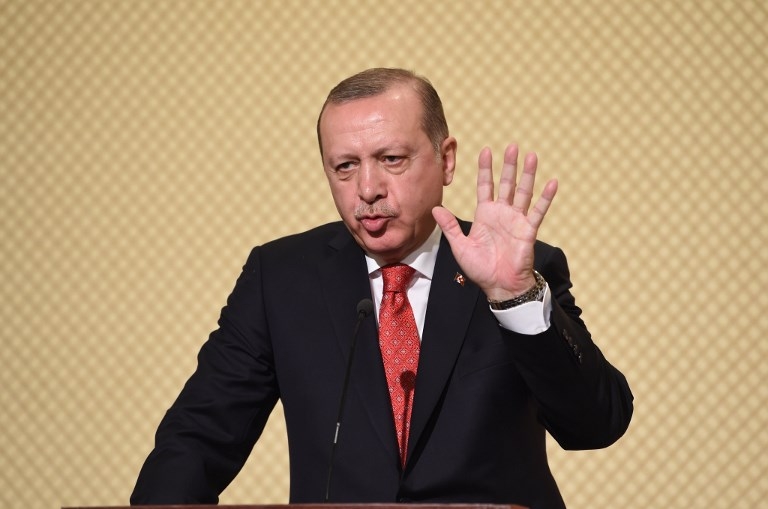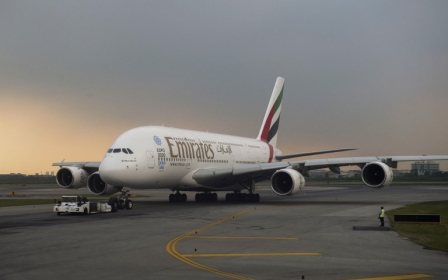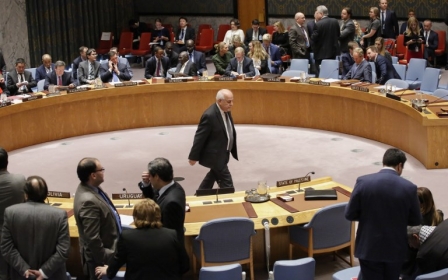Turkish president says 'terrorist' Assad cannot be part of Syria solution

Turkish President Recep Tayyip Erdogan on Wednesday called Syrian President Bashar al-Assad a "terrorist" and said it was impossible for Syrian peace efforts to continue with him.
Erdogan made his comments while in Tunis to sign key agreements along with 10 government ministers and more than 150 businessmen on the final leg of a tour that has also taken him to Chad and Sudan.
'How can we embrace the future with a Syrian president who has killed close to a million of his citizens?'
- Turkish president Recep Tayyip Erdogan
Syria's foreign ministry quickly responded by accusing Erdogan of himself supporting terrorist groups fighting Assad in Syria's civil war.
Early on in the war, Turkey demanded the removal of Assad from power and backed rebels fighting to overthrow him. But it has toned down its demands since it started working with Assad's allies Russia and Iran for a political resolution.
"Assad is definitely a terrorist who has carried out state terrorism," Erdogan told a televised news conference with his Tunisian counterpart, Beji Caid Essebsi, in Tunis.
"It is impossible to continue with Assad. How can we embrace the future with a Syrian president who has killed close to a million of his citizens?" he said, in some of his harshest comments in weeks.
Border threat
Though Turkey has long demanded Assad's removal, it is now more focused on the threat from Islamist militants and Kurdish fighters it considers allies of the Kurdistan Workers' Party (PKK), who it says have formed a "terror corridor" on its southern border.
Turkey says the Syrian Kurdish YPG militia, which Ankara views as an extension of the outlawed PKK, which has fought a campaign in southeast Turkey since the 80s, cannot be invited to Syrian peace talks in the Kazakh capital Astana.
The YPG is the main element in a force that Washington has assisted with training, weapons, air support and help from ground advisers in the battle against the Islamic State group. The US support has angered Ankara, a NATO ally of Washington.
Despite its differences with Russia and Iran, Turkey has worked with the two powers in the search for a political solution in Syria.
The three powers brokered a deal to set up and monitor a "de-escalation zone" to reduce fighting between rebels and Syrian government forces in Syria's rebel-held northwestern Idlib province.
"We can't say (Assad) will handle this. It is impossible for Turkey to accept this. Northern Syria has been handed over as a terror corridor. There is no peace in Syria and this peace won't come with Assad," Erdogan said.
Syria's state news agency SANA quoted a foreign ministry source as saying Erdogan "continues to misdirect Turkish public opinion with his usual froth in an attempt to absolve himself of the crimes which he has committed against the Syrian people through advancing support to the various terrorist groups in Syria".
Investment deals
During his visit to Tunis, Erdogan also signed agreements on defence, investment and the environment.
"We affirmed the desire of the two states to strengthen cooperation... taking into account the circumstances affecting Tunisia," Essebsi said.
The Tunisian leader went on to praise "the understanding shown by the Turkish president regarding these circumstances".
Tunisia's trade imbalance has increased considerably, reaching $649m in the first 10 months of 2017, and the country has reinstated customs duties on certain products imported from Turkey.
Earlier this month, in a move that surprised and angered many Tunisian politicians, the European Union listed the country as a tax haven.
"Turkey supports Tunisia in difficult times," said Erdogan. "The development of Tunisia is the development of Turkey."
Journalists staged a protest when Erdogan arrived in the country on Tuesday night to denounce violations against freedom of expression in Turkey and the imprisonment of numerous media workers there.
New MEE newsletter: Jerusalem Dispatch
Sign up to get the latest insights and analysis on Israel-Palestine, alongside Turkey Unpacked and other MEE newsletters
Middle East Eye delivers independent and unrivalled coverage and analysis of the Middle East, North Africa and beyond. To learn more about republishing this content and the associated fees, please fill out this form. More about MEE can be found here.




